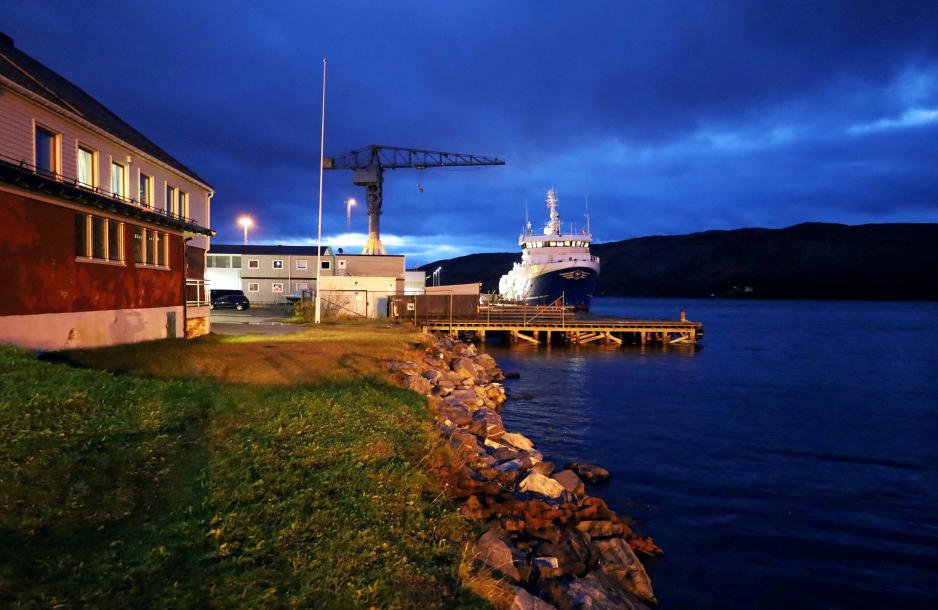The Sanctions Against Russia Are Determined by Our Own Needs
The gas carrier Vladimir Voronin anchored off the coast of Honningsvåg in Northern Norway on the 15th of April 2023. (Photo: Kjell-Bendik Pedersen)
(Commentary) Around 20 Norwegian businesses are under investigation for violating the sanctions against Russia. At the same time, Russian gas carriers anchor in Norwegian ports and fill up the Russian coffer with euros and dollars.
The latter is apparently completely legal. The first could warrant high fines and, in the worst case, imprisonment for those involved.
Causes less attention
The tankers, which export Russian gas via Norway, cause less attention than Russian trawlers who are docked in selected Norwegian ports.
Norway adheres to, with few exceptions, the EU's sanctions policy against Russia. Gas is not on this list. Technical services for Russian fishing vessels, however, are.
The background is obvious. Europe cannot replace the Russian gas but can manage without shipyards along the Finnmark coast in Northern Norway. That is the simple logic of the sanctions regime.
One is legal, the other could lead to imprisonment.
Violations are unacceptable
And to avoid any misunderstanding. Any violation of the sanctions regime is unacceptable, whether it happens in Drøbak or in the north of Norway.
Instead of sanctioning gas, the EU has attempted to sanction the ships that ship gas from Siberia to the European markets. This is where the difference between technical assistance for fishing vessels and operating large LNG vessels arises.
The gas that Novatek, a Russian-dominated company sanctioned by the US and some EU countries, produces for the European market, has until recently been shipped by Russian ships with long-time charters.
The ships, which High North News has documented, are still the same. They even have the same names and the same contracts.
But they are no longer Russian. If they were, any assistance in Norwegian ports would have been sanctioned. It would also be difficult, if not impossible, to insure ships and cargo.
The ship owners saw the sanctions coming and beat them to it, as ship owners often do.
Rebaptism
When Vladimir Voronin, according to our investigations, changed crew in Honningsvåg on the 15th and 16th of April, the Russian Maritime Register had been replaced by the French certification company Bureau Veritas. The insurance was also taken care of. The insurance company Skuld, based in Oslo, saw to that.
The situation was the exact same for Eduard Toll which anchored outside Honningsvåg in Northern Norway 14 days later. Again to change crew.
Both ships fly the flag of the Bahamas.
This is not just a story of agile ship owners.
Whether provisions or other assistance were also provided, no one will comment on. In the same area as the newly rebaptized French LNG ships changed crews, the transshipment of gas from Russian tankers to Western ships would take place before the sanctions.
As this commentary is being written, Vladimir Vornonin is located in the North Sea at about the same latitude as Tromsø. The ship is headed north at a speed of 19.6 knots. Eduard Toll is sailing in the Kara Sea, north of Siberia.
Outside Honningsvåg, the Norwegian fishing fleet is dominating.
The ship owners are experts
The anchoring and the crew change outside Honningsvåg are apparently completely legal and tell the same story as when the apartheid regime South Africa was sanctioned in the 1960s. Back then, as now, international shippers were essentially experts in circumventing the sanctions' goal and purpose.

The Norwegian Police Security Service is investigating possible violations of the sanctions against Russia. Kimek in Kirkenes has furloughed its employees while awaiting the investigation. Here, the Russian trawler "Nord Tral" is docked by the shipyard this winter. (Photo: Astri Edvardsen)
This is now just a story of agile ship owners. It is also a story of a Europe that is dependent on Russian gas and which therefore continues to fill the Russian coffer with capital to fund ammunition for the warfare against Ukraine.
I do not know whether the shipyard Kimek in Kirkenes, for example, one of the shipyards in the spotlight of the police, has violated the sanctions. We will find out when the Police Security Service has concluded its investigation.
However, I do know that if Kimek or other shipyards had provided assistance for former Russian gas carriers under the Bahamas' flag, instead of Russian trawlers, everything might have been okay.
No matter how Russian the owners may be. And how significant it would be for the Russian war machine.
That is not a defense for any violations of the international sanctions policy. It is rather a call for sanctioning where it hurts the most, not just where it causes the least discomfort for the sanctioning countries.
Also read
This commentary was originally published in Norwegian and has been translated by Birgitte Annie Molid Martinussen.



